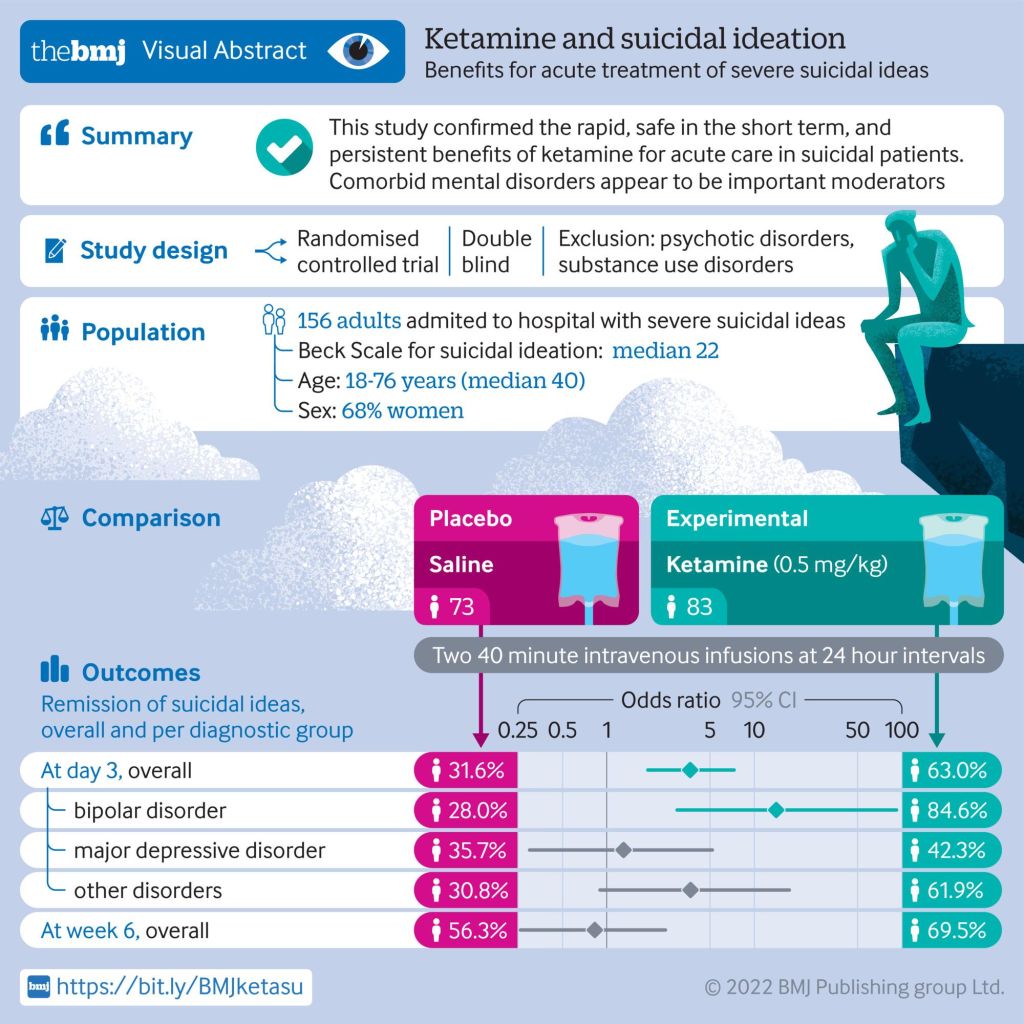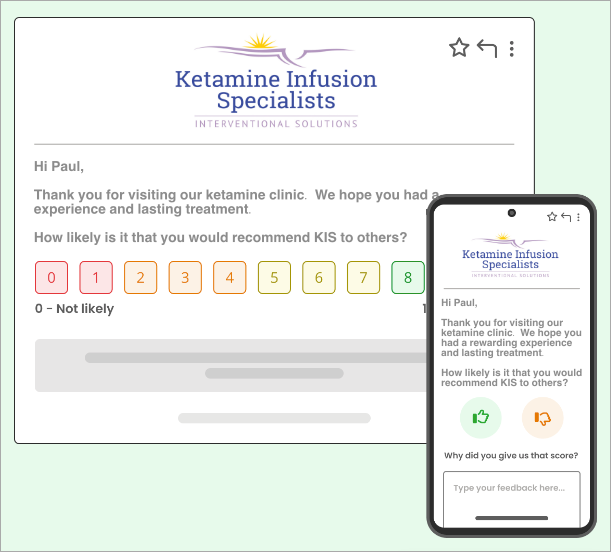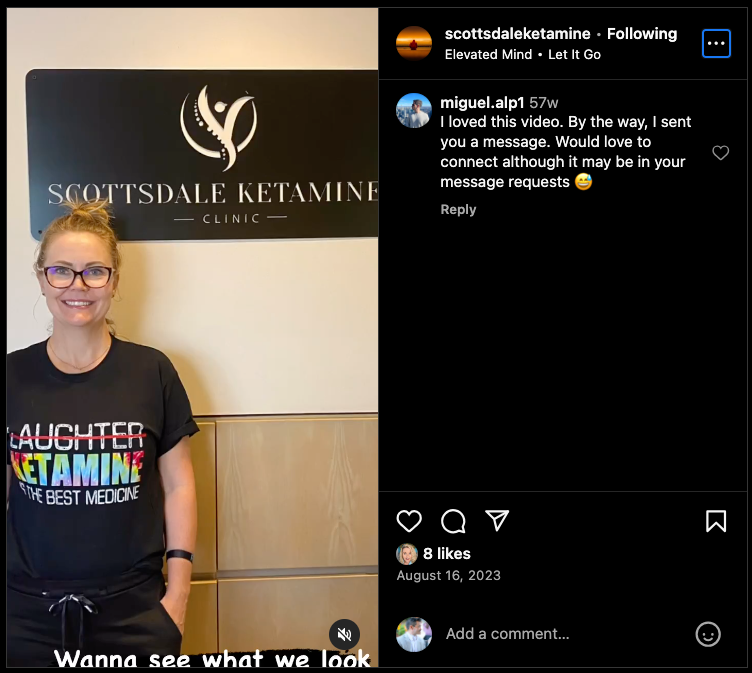
With 90% of Americans saying it is now a pandemic, the growing mental health crisis has made it important for therapists of all types to market their services and make them accessible to those in need. With the psychedelic renaissance in mental health accelerating, the ketamine therapy industry is growing, and along with it, more competition.
This article will assist ketamine therapy clinics and practitioners in keeping pace with the industry’s growth and staying ahead of the competition by:
- Acknowledging the timely imperative of marketing your ketamine businesses
- Understanding the importance of modern website design
- How to market to, and attract qualified patient leads
- Knowing what pain points and solutions to offer patients when marketing to them
- Identifying essential tools and strategies to use in ketamine marketing
- Highlighting content marketing best practices for ketamine therapy
- Addressing the unique challenges of marketing ketamine therapy
Why Is Marketing Important for Ketamine Therapists?
The rapidly evolving ketamine therapy market consists of long-standing companies as well as newcomers. Competition in the market is influenced by various factors, including the standing of ketamine clinics, their track record of delivering positive results, endorsements from satisfied patients, and collaborations with healthcare experts.
Just last year, ketamine therapy business integrator, Journey Clinical, added ketamine therapy service offerings to over 1,500 existing mental health providers across the country. Now, more than ever, it is essential for ketamine therapy practitioners and clinics to differentiate themselves and reach potential clients effectively.
The good news is, the ketamine therapy industry is still in its nascent stage, and an overwhelming majority of clinics lack digital marketing expertise. Meager marketing efforts by these ketamine therapy businesses make it relatively easy for savvy clinics using comprehensive marketing strategies to differentiate themselves. With a strong online presence and the ability to effectively reach potential clients through social media and other digital platforms, savvy ketamine clinics can effectively grow their practices and reach those in need of their services.
The Importance of Modern Website Design
A businesses online presence is everything in today’s digital age, and your website is often the first impression potential patients will have of your ketamine clinic. In this regard, the aesthetics of your website should be given the highest priority to your overall online presence. Website aesthetics can be based on elements such as white space, color scheme, font, alignment, navigation, menus, imagery, interactivity, and other factors.
For the most part, ketamine clinic websites lack the features, functionality, and aesthetics of their more established industry counterparts, like this example with the floating paddle board lady. Have a look around at some other clinic websites and do your own assessment.

If you want your ketamine therapy clinic to stand out from the sea (pun intended) of ever-growing local competition, don’t be the floating lady. Invest heavily in website redesign if yours is dated, off-topic, distorted looking on mobile platforms, or just plain uninspiring.
How will you know? This article by Looka, 15 Website Design Trends You Don’t Want to Miss in 2024 is one of the best available for you to glean some insight and inspiration and stay current on evolving website aesthetic trends for the year. Examples featured, and rarely seen on ketamine clinic websites, include winning design elements like:
Animation stimulation

Scrapbook layering

Moving type

Paying Attention to Website Performance
To improve the effectiveness of your online presence, it is important to focus on mobile optimization, search engine optimization, quality, long-form content, consistent content publishing, link building strategies, patient testimonials, and website user engagement. By optimizing your website for mobile devices and ensuring it is easily found in search engine results, you can increase the likelihood of potential patients finding and choosing your ketamine therapy clinic.
Fortunately, there are a handful a great, and even free, tools that will help you with an initial assessment of your website and its potential for online success.
Ionos Website Checker will check for:
-
- Website presentation (e.g., do you have floating ladies)
- Accessibility via search engines
- Website security
- Website speed
One of the most popular free website checkers for SEO is ahrefs, and will let you:
-
- Monitor your website’s SEO health
- Check for 140+ SEO issues
- View all your backlinks
- See all the keywords you rank for
- Find internal linking opportunities
Quality, long-form content and consistent publishing can also help to establish your clinic as an authority in the field of ketamine therapy. Additionally, utilizing patient testimonials and engaging website features can help to build trust and connection with potential patients, ultimately leading to more conversions and a successful marketing strategy for your ketamine practice.
How to Market Ketamine Treatment to Patients
When marketing ketamine treatment to patients, it is important to focus on the unique benefits and potential impact on their mental health. Emphasizing the fast-acting nature of ketamine therapy in relieving symptoms of chronic mental health conditions can be a key selling point. Highlighting its effectiveness in treatment-resistant cases and its ability to provide long-lasting relief can also be appealing to patients.
Patient testimonials and success stories can help build trust and credibility. Building a supportive and compassionate environment can also encourage patients to consider ketamine therapy as a viable treatment option for their mental health struggles.
Additionally, providing educational materials and resources to help patients understand the treatment process, potential side effects, and expected outcomes can help in making informed decisions. The Injection & Infusion Clinic of Albuquerque New Mexico does a great job of this in one of their blog posts, educating readers on the pros and cons of ketamine therapy so they can determine whether to use it for their conditions. The detailed, long-form piece is accompanied by a supporting infographic.

Effectively Marketing Ketamine Therapy in the Context of Mental Health Propositions
When marketing ketamine therapy in the context of mental health propositions, it is crucial to first identify the user condition and understand the symptoms that the potential clients may be experiencing. By understanding the user symptoms, marketers can then use specific search keywords to target individuals who may benefit from ketamine therapy.
It is important to educate the public about how ketamine therapy can be used to treat conditions such as treatment-resistant depression, anxiety, and PTSD. Marketers can also leverage studies that prove the effectiveness of ketamine therapy in treating these conditions, providing legitimacy to their marketing efforts. Additionally, success testimonials from current or former clients can serve as powerful marketing tools, as they provide real-life examples of how ketamine therapy has positively impacted individuals’ mental health.

In using these strategies, marketers can help to destigmatize ketamine therapy and position it as a legitimate and beneficial treatment for mental health conditions. This, in turn, can help to increase awareness and access to ketamine therapy for those who may benefit from it, ultimately improving the mental well-being of individuals in need.
Using Marketing to Highlight the Potential of Ketamine in Suicidal Ideation Cases
In recent years, there has been increasing evidence to suggest that ketamine may be a potentially effective treatment option for people struggling with suicidal ideation. A study conducted by seven French teaching hospitals between 2015 and 2019 found that ketamine was rapid and safe in the short term, and had persistent benefits for acute care in suicidal patients.

Despite this potential, many people may still be unaware of the potential benefits of ketamine in these cases. This is where marketing can play a crucial role in highlighting the potential of ketamine as a treatment for suicidal ideation. By effectively communicating the research and evidence supporting ketamine’s potential effectiveness, marketing can help raise awareness among both healthcare professionals and potential patients struggling with suicidal ideation.
This can ultimately lead to increased access to ketamine treatment and potentially save lives. Marketing efforts can also help to reduce the stigma surrounding ketamine and promote a better understanding of its potential benefits. Through targeted marketing strategies, the potential of ketamine in suicidal ideation cases can be effectively communicated and leveraged to improve mental health outcomes for those in need.
Marketing Strategies for Ketamine Therapy in Treatment-Resistant Depression
A study in the Journal of Psychosocial Nursing and Mental Health Services estimated that almost a third of the nearly nine million people in the United States treated for depression each year have treatment-resistant depression (TRD). With limitations in medication options as a significant roadblock, ketamine therapy for has gained interest and viability as a potentially groundbreaking treatment option for TRD. As many as 70% of patients with TRD show a significant response to ketamine therapy, making it over twice as effective as any conventional antidepressant.

Marketing strategies for ketamine therapy services may include targeted advertising to reach people who have not found relief from traditional treatments, as well as promoting ketamine therapy success stories through various media channels. By partnering with mental health organizations and participating in industry events, ketamine practitioners can establish credibility and build trust within the medical community.
It is crucial for marketing strategies to be both informative and empathetic, emphasizing the potential life-changing impact of ketamine therapy for those suffering from treatment-resistant depression. By effectively communicating the benefits and success stories, the market for ketamine therapy can be expanded and more people can potentially find relief from their debilitating symptoms.
Attracting Qualified Leads and Patients for Ketamine Therapy
Attracting qualified leads and patients for ketamine therapy can be a challenging task, especially given the unique characteristics of the target audience. Targeting patients who have already tried other forms of therapy and had limited success can be a viable approach, as they may be more open to exploring alternative treatment options.
At the same time, it is essential to focus on attracting patients who can afford the out-of-pocket expense as insurance typically does not cover ketamine therapy. For an individual to be truly qualified they must be someone willing and able to invest in their wellbeing, as the cost of ketamine therapy can be high.

By focusing on these specific demographics and addressing the financial aspect, businesses offering ketamine therapy can effectively attract qualified leads and patients who are more likely to benefit from their services.
Essential Tools and Strategies for Ketamine Patient Lead Generation
Marketing technology is constantly advancing. Most recently, artificial intelligence (AI) has strengthened the power of digital marketing tools to accomplish more, with better accuracy, in less time. Leveraging the latest marketing tools and technologies, and incorporating them into a comprehensive marketing strategy is essential for promoting your ketamine therapy services.
Lead generation tools, such as CRM software and email marketing platforms, can help target potential patients and build relationships with them. But doing so effectively means ketamine therapy marketers need to connect with potential patients on all four parts of your sales funnel (Awareness, Interest, Decision, Action). Most ketamine therapy clinics fail to see through the entire lead generation process, or throw a ‘net’ to capture new leads that is too narrow, or neglect lead generation all together.

Google Business Profile: Your Key to Local Patient Attraction
The first thing potential ketamine therapy patients will search when seeking services is those businesses within their vicinity. Getting to a ketamine therapy clinic doesn’t hold the same venturing incentive as needing to drive more than just a few towns over to reach the nearest IKEA for a plate of their amazing meatballs. No one wants to drive further than necessary for mental health services.
For this reason, optimizing and regularly maintaining your Google Business Profile is key. Google’s algorithm considers the following when generating potential patients search results for local ketamine clinics:
-
- Relevance – How well your local listing matches what someone is looking for
-
- Distance – How far the searcher is from the location term used in searching
-
- Prominence – How well-known a business is, the more positive reviews and information on the web, the better
We offer a comprehensive, step-by-step guide to optimizing your ketamine clinic’s Google Business Profile in another reference blog post.
Email Marketing for Lead Generation
Email marketing is an essential tool for rebooking patients and generating referrals!
Patient lead generation through email marketing success depends heavily on how your message is written.
User search intent tools, like Google Analytics, can provide insights into what potential patients are looking for in relation to ketamine therapy, allowing for more targeted marketing strategies. Keyword search tools, such as SEMrush, can help identify the most relevant and high-traffic keywords in the industry, enabling the creation of content that resonates with patients and improves search engine optimization.
Hosting events is a proven way to generate leads. Livestorm is a video engagement platform that allows users to easily host live, on-demand or automated virtual events.
Additionally, competitor analysis tools, like SpyFu, can assist in identifying opportunities and threats in the market, helping to refine marketing strategies and stand out from the competition. By leveraging these tools and technologies, ketamine therapy providers can enhance their digital marketing efforts, attract new patients, and ultimately improve the accessibility of their services to those in need. It’s crucial for ketamine therapy providers to stay ahead of the curve and embrace the latest marketing tools and technologies to effectively reach and connect with potential patients.
Using Social Media Platforms for Ketamine Therapy Lead Generation
In recent years, there has been a significant rise in the use of social media platforms for marketing ketamine therapy. As the only legal psychedelic and a legitimate, proven mental health therapy, ketamine is becoming more widely accepted by both social networks, such as Instagram, and advertising networks, like Google.
Instagram, in particular, has become a popular platform for ketamine therapy marketing, allowing clinics and practitioners to showcase their services and success stories to potential clients. The platform’s astounding statistics explain why.
-
- Instagram is the world’s second-favorite social media platform
- Instagram is the 4th most-visited website in the world
- 62.4% of social users use Insta to follow or research brands or products
- Conversations with customers in Instagram DMs convert 70% of the time
- Instagram users spend an average of 12 hours a month on the app
Instagram allows for organic ketamine topic posting, as well as ketamine therapy advertising.
Research shows that the best time to post photos on Instagram is 11 a.m. on Wednesdays. For Instagram Reels, it’s 9 a.m. and 12 p.m. Monday to Thursday. To optimize your link-in-bio for a mobile-first experience, Buffer Start Page offers a customizable landing page for all your ketamine clinic’s important links and contact information.
Other notable Instagram marketing best practices include:
- Develop a consistent style so viewers can recognize your posts when they appear in their feed
- Post pictures of your ketamine clinic’s environment and staff to offer viewers insight into your practice
- Use, but don’t abuse hashtags (#) to reach your audience using a location (city), related keywords (“mental health,”) and even condition (“depression”)
- Add alt text to your photos by scrolling down to the bottom of the screen where you write your caption and tapping “Advanced settings”
- Use trending audio in your reels and stories
YouTube
YouTube stands out as the most lucrative platform for video sharing and advertising globally. Over the past decade, no other website has provided such unprecedented opportunities to gain overnight popularity and earn online simply by uploading videos. The social media platform reached 2.7 billion active users in 2023, making it one of the most popular sites in the world, behind only Google and Facebook on total usage. And ‘YouTube’ itself was officially the most searched term on Google globally in 2023, and for the third year running.
The dominance of video marketing is evident in today’s content marketing industry, and it’s no exception for ketamine therapy businesses. For marketers, leveraging video not only offers the highest ROI of any media format, but it plays a key role in executing on a comprehensive marketing strategy.
Because of the diverse subject matter it offers viewers, YouTube has proven to be a highly effective platform for ketamine video marketing, where clinics and experts can share informative and educational content about the therapy. Recent additions to the platform, including Shorts, Live streaming, Chapters, Premieres, Community Tab, and more, provide ketamine therapy marketers different ways of repurposing video content, and consistently draw in an increasing number of consumers.
With the ongoing evolution of advertising regulations, ketamine therapy has become more accepted by online advertising networks, enabling clinics to reach a broader audience. As the demand for mental health treatments continues to grow, effective, consistent use of social media platforms for ketamine therapy marketing has become essential for clinics and practitioners to effectively connect with potential clients and establish their presence in the market.
Using Social Listening Tools to Facilitate Conversations
Social listening can reveal discussions and inquiries related to mental health and related conditions on social platforms, and is a proactive way to track, analyze, and respond to these conversations. View social listening not as an opportunity to immediately engage in selling, but as a chance to cultivate connections with potential patients in the mental health industry, whom you can then nurture into relationships conducive to lead generation.
Hootsuite Insights can elevate your ketamine clinic’s listening experience by providing data from a staggering 16 billion new social posts each month. It enables the discovery of significant trends and patterns that might go unnoticed when solely monitoring keywords and hashtags. Further customization allows you to filter your searches by date, demographics, and most importantly, location, ensuring you pinpoint the most relevant mental health related conversations.

Talkwalker is another social listening tool that offers robust social listening not just from social media channels, but by analyzing blogs, forums, videos, news sites, and review sites, as well. Talkwalker draws data from more than 150 million sources, and the tool’s advanced filters let you segment your data for key conversations like those around psychedelic therapy, ketamine therapy, and mental health.

Encouraging Online Reviews for Credibility in Lead Generation
Online reviews offer potential patients seeking a ketamine practitioner or clinic insights into how others perceive the services, facilities, treatments, and overall experience provided. Positive reviews serve as valuable social proof, indicating that your clinic is trusted by patients. Positive feedback from patient reviews can be as significant as recommendations from friends and family, and is essential to staying ahead of your competitors.
Statistics from BrightLocal back this:
- 69% of consumers only trust business reviews left within the last month
- 10 reviews is the average number of reviews a consumer will read before making a decision
- 70% of people will only use a business if it has a star rating of four stars or above
Encouraging your current ketamine therapy patient base to share their experiences on platforms like Google or social media channels can be relatively frictionless and easy with the right tools. With BrightLocal, you can simply upload customer details in bulk and request reviews in just a few clicks, with automated follow-up messages already configured to send reminders and prompt a second opportunity.

EmbedSocial is an another favorite online reputation tool that will help your ketamine therapy business manage its online reputation status by managing reviews, collecting new ones, and showcasing them on any website. Its ability to embed Google reviews automatically from multiple Google locations, which can engage local customers and also increase local search traffic.
Addressing the Unique Challenges of Marketing Ketamine Therapy
Marketing ketamine therapy presents unique challenges due to its classification as the only legal psychedelic and a Schedule III controlled substance. With limited advertising channels available for promoting the therapy, reaching the target audience can be difficult. Additionally, ketamine is known to be misused as a party drug, creating a stigma that needs to be addressed in marketing efforts.

Strategies for Marketing Ketamine Therapy in a Substance Misuse Context
Ketamine came under greater public scrutiny after the death of actor Matthew Perry who had levels of the drug in his body in the range used for general anesthesia during surgery. Savvy, proactive ketamine clinics quickly responded to the incident by educating the public about the benefits of ketamine therapy for mental health issues while also addressing concerns about its potential for misuse.
Rather than highlighting the drawbacks of ketamine, it’s important to showcase its effectiveness through the dissemination of case studies, medical research, and press releases that illustrate the positive outcomes and success stories of the treatment for numerous patients. Additionally, marketing materials should emphasize the importance of proper diagnosis and treatment by a qualified medical professional, raising awareness about the differences between recreational and therapeutic use.
Compliance and Legal Considerations in Ketamine Therapy Marketing
It is important for ketamine marketers to stay up-to-date with the evolving regulatory landscape surrounding ketamine therapy, as laws and guidelines may change over time. Ensuring that all ketamine therapy marketing materials are accurate, not misleading, and do not encourage off-label use unless prescribed, are essential to staying legally compliant when marketing the service.
Additionally, it is essential to consider patient privacy and confidentiality when marketing ketamine therapy, in line with healthcare privacy laws such as the Health Insurance Portability and Accountability Act (HIPAA). By prioritizing compliance and legal considerations in ketamine therapy marketing, practitioners and marketers can maintain the integrity of the treatment and promote it responsibly within the bounds of the law.



